FEATURED STORY JET condemns destruction of mangrove forests

JAMAICA – The Jamaica Environment Trust (JET) says it is extremely concerned about the continued destruction of Jamaica’s mangrove forests. JET says it recently received reports alleging the removal of mangroves within the Palisadoes Port Royal Protected Area by a state agency in the absence of the required environmental permit. The organisation says it also received reports of further removal of mangroves to facilitate the expansion of the town of Falmouth. Mangrove forests are one of the most productive and biologically diverse ecosystems on the planet and their conservation is a key natural adaptation strategy and mitigation measure in response to climate change, providing protection against storms, JET emphasised. It acknowledged that the Government has recognised the island’s vulnerability to climate change as a Small Island Developing State and has stressed the importance of adaptation. Noting that the Forestry Department plans to restore several of the island’s mangrove ecosystems and intends to prepare a plan to manage these forests, JET believes that the agency is too slow to act, arguing that these plans may not be completed until next year. While this is still being prepared mangroves continue to be destroyed, the organisation stressed. READ MORE GLOBAL Mangrove restoration done right has clear economic, ecological benefits

GLOBAL – In the green and dimly lit mangrove forests of West Papua in Indonesia, towering Rhizophora trees loom more than 40 meters (130 feet) overhead into the canopy, their tangled roots taller than a human. Oceans away in the Caribbean, mangroves of the same genus reach a maximum of 2 m (6 ft) in height, their shrubby stuntedness belying decades of growth. That mangroves come in such varied forms is evidence of their adaptability, says Dan Friess, associate professor and head of the Mangrove Lab at the National University of Singapore. Yet mangrove restoration projects have some of the highest failure rates around. Adaptable as mangroves may be, straddling the border between land and sea is uniquely stressful. Misguided restoration efforts — planting the wrong species in the wrong places in the wrong densities — push their stress levels further to the breaking point. “There’s a common misconception that because mangroves grow by the sea, they love seawater. But they’re just tolerating it,” Friess said. “It’s a very stressful environment, and that’s why so many mangrove restoration projects fail.” READ MORE AFRICA Restored mangroves holding back sea level rise
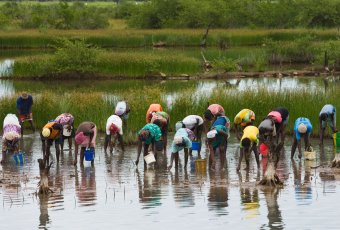
SENEGAL – Thousands of hectares of restored Mangroves are changing the lives of local fishing communities in Senegal and helping them tackle climate change. Mangroves are essential for preventing soil erosion, holding back rising sea levels and promoting marine ecosystems. Africa has lost nearly 500,000 hectares of its mangroves due to drought, deforestation and construction in the last 25 years, according to the UN International Fund for Agricultural Development. In Senegal, one local project is investing in mangrove reforestation and local communities to help preserve local villages and help them to tackle and adapt to the changing climate. READ MORE Degradation of the Mindoubé mangrove reaches its alert level
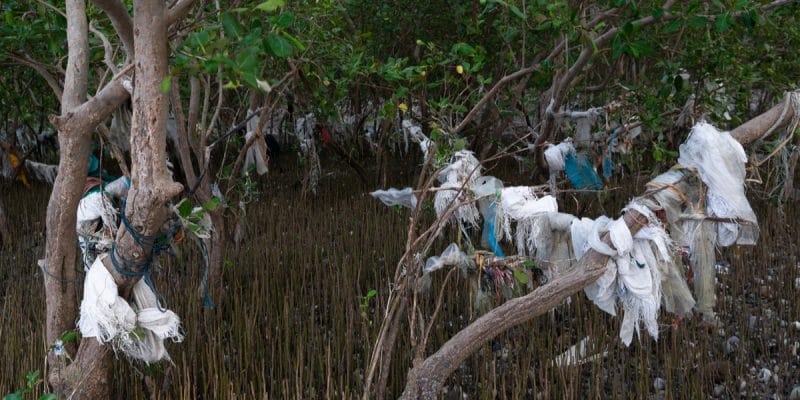
GABON – The degradation of the Mindoubé mangrove is of concern to the Gabonese authorities. The area located in the fifth district of the capital Libreville received on August 4th, 2021, a restoration mission led by the Deputy Secretary General of the Gabonese Ministry of Water and Forests. Armed with rakes and boots, the agents of the ministry cleaned up the surroundings of this important carbon sequestration and fauna and flora reproduction environment. Preceded by a conference-debate on the ecological role of mangroves, the restoration mission carried out in Mindoubé, comes within the framework of the delayed celebration of the International Day of Mangroves, under the national theme “the mangrove: place of carbon sequestration and reproduction of fauna and flora”. The deputy secretary general of the Ministry of Water and Forests reminded the audience that it is always possible to take action to reforest devastated areas. READ MORE Even as the government bets big on carbon, REDD+ flounders in Madagascar

Madagascar is a potentially excellent site for REDD+, but only a handful of projects spearheaded by foreign NGOs have taken root here. The government’s recent move to centralize control over carbon credits has created confusion over the fate of these projects and the future of REDD+ in Madagascar. The Malagasy government placed a moratorium on the sale of carbon credits three years ago. Under President Andry Rajoelina, the country set out to nationalize its carbon rights. As a result, all its REDD+ initiatives, including Blue Ventures’ Tahiry Honko, were put on hold. The country’s environment minister singled out the project for criticism for selling the Malagasy people and the government short. The 20-year project was initially supposed to pull in $27,000 a year at around $20 per credit. Half the funds were set aside for the 10 villages that are part of the program. Blue Ventures denies the promised funds are too little. Meanwhile, the country has signed an agreement with the World Bank to sell 10 million carbon credits generated from protecting its rainforests, at $5 per credit, the standard rate for World Bank-backed programs. READ MORE AMERICAS Pew Applauds Belize’s Ambitious Commitment to Protect Coastal Wetlands
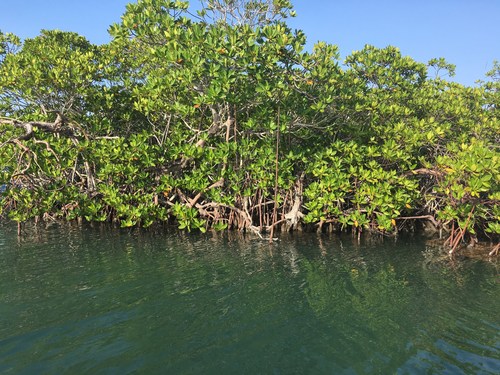
BELIZE – The Pew Charitable Trusts today congratulated the government of Belize for committing to protect and restore mangrove and seagrass ecosystems within its updated nationally determined contribution (NDC) to the Paris Agreement. The country’s actions will help safeguard the vital ecosystem, biodiversity, and climate benefits that these habitats provide.”Coastal ecosystems have historically been a vital part of Belize’s natural and cultural heritage,” said Dr. Kenrick Williams, CEO of Belize’s National Climate Change Office within the Ministry of Sustainable Development, Climate Change and Disaster Risk Management. “By committing to the protection, conservation, restoration, and expansion of these ecosystems, we aim to demonstrate the important role that nature-based solutions can play in reducing climate risk impacts and absorbing carbon, in addition to a multiplicity of other social and economic benefits. In the long term, Belize will continue to show real leadership in valuing the contribution of these systems that so many of our people depend on for their protection and livelihood.” READ MORE Successful mangrove restoration on Pigeon Key
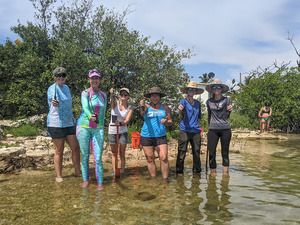
USA – On the day after #WorldMangroveDay, a coalition of motivated and dedicated volunteers from all over the Keys joined forces on Pigeon Key to plant over 1,000 red mangrove seedlings. Mangroves protect coastlines from storm surge and erosion, sequester carbon, and absorb harmful nutrient runoff that can kill corals. Hurricane Irma destroyed almost all the critical mangrove habitat on the island, so the Pigeon Key Foundation and Marine Science Center worked to get native mangroves to the island and volunteers to plant them. Last October, the Conch Republic Marine Army collected thousands of mangrove propagules to help with this effort. Florida mangrove restoration organization MANG grew the propagules into year-old seedlings in its mainland nurseries and led restoration efforts for the day. “You’re going to have to dig deep and get a little dirty,” Mang co-founder Kyle Rossin told the crowd. Armed with buckets of “baby mangs” and tools to help dig on the rocky shores, volunteers from local schools and organizations took up his challenge. READ MORE ASIA Bhitarkanika’s mangrove ecosystem may suffer due to reduced freshwater supply

INDIA – Bhitarkanika Wildlife Sanctuary could be poised for a significant rise in salinity levels and change in vegetation pattern across the crucial mangrove ecosystem, thanks to a projected drastic reduction in freshwater flow into the Ramsar site over the next few decades. The hydro-ecological assessment report of the Ministry of Environment, Forest and Climate Change (MoEFCC) which used modeling systems to calculate fresh water supply to the sanctuary in the coming years says that future developments could seriously impact growth of the area. The report says freshwater availability at Bhitarkanika sanctuary’s boundary will be reduced by about 38-44 per cent (pc) during monsoon and 33-39 pc during non-monsoon. This might increase salinity level to a great extent. The key impact of reduced freshwater flow on mangrove health will be reflected through increased salinity and reduced flow of sediments which can have serious consequences on species composition. READ MORE SK Innovation wins achievement award from Vietnam for its mangrove forest restoration project

KOREA – SK Innovation announced on August 30 that it had been recognized for its contribution to the mangrove forest restoration project, which is a practical ESG (environmental, social, and governance) management activity, by the Vietnamese government of Tra Vinh. On August 9, the Vietnamese government of Tra Vinh recognized the contribution to mangrove forest restoration and conservation of natural resources, and awarded the achievement award to SK Innovation and Manglub, a social enterprise that successfully carried out business in Vietnam. Manglub, a social enterprise nurtured by SK Innovation, received this award in the sense that it is developing and operating various educational platforms for reforestation and monitoring of mangrove forests in Vietnam and improving environmental awareness of local residents three years after its establishment. SK Innovation was highly praised for continuing the mangrove forest restoration project despite difficulties in local planting activities due to the impact of COVID-19. READ MORE Mangrove restoration scales up in Indonesia
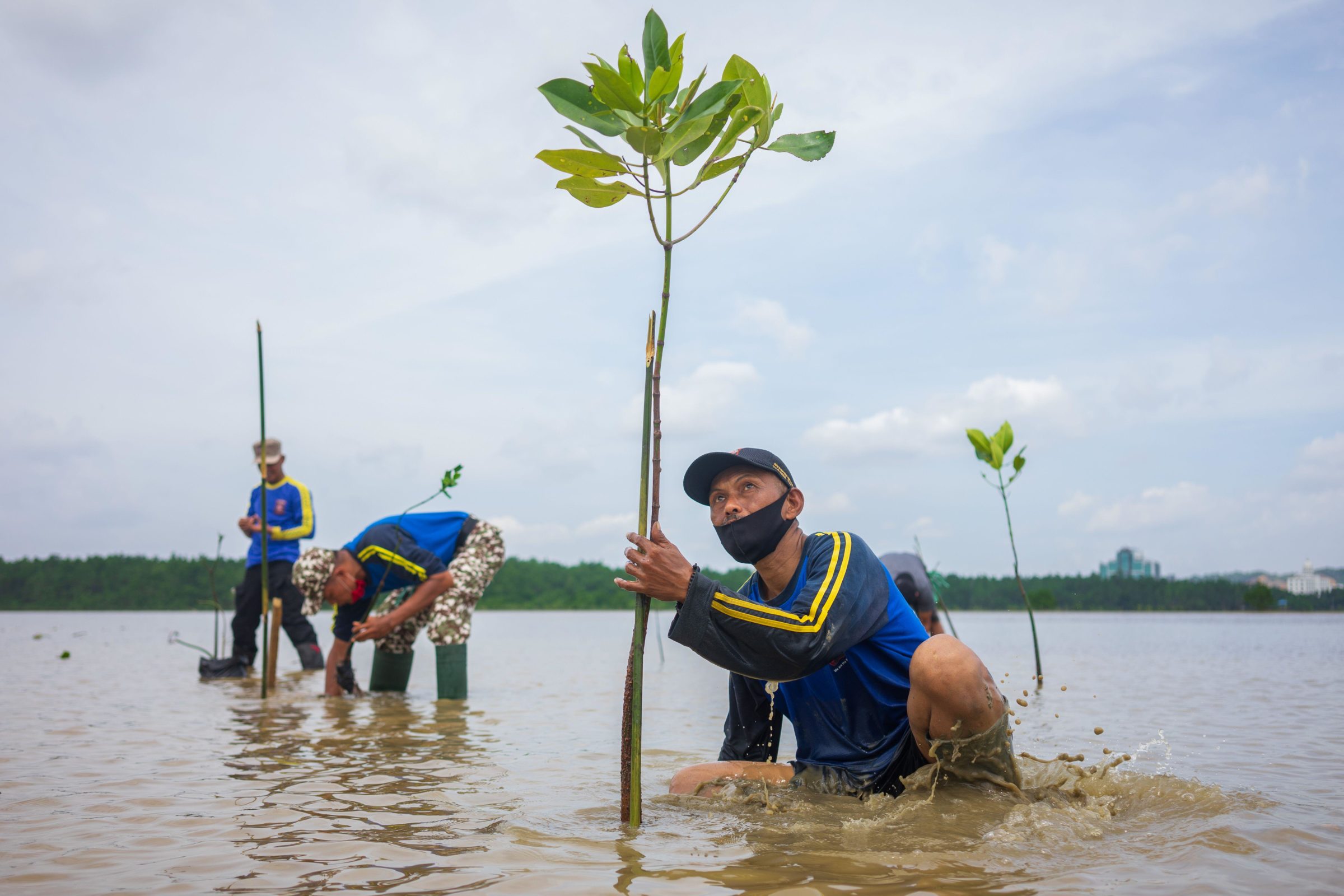
INDONESIA – As the risks of sea level rise, stronger tropical storms and seawater intrusion grow due to climate change, Indonesia is ramping up efforts to protect mangrove ecosystems across the archipelago as part of both its Covid-19 recovery efforts and climate change commitments. Currently, Indonesia has about 3.2 million hectares of mangroves. The goal is to rehabilitate 150,000 hectares of degraded mangrove this year, and a total of 600,000 hectares by 2023. The effort is being led by Indonesia’s coordinating minister for maritime affairs, Luhut Binsar Pandjaitan, and the Ministry for Environment and Forestry, with support from the World Bank and local NGOs. “The government of Indonesia has taken several bold initiatives to protect and restore critical coastal ecosystems, particularly coral reefs and mangroves,” said Andre Aquino, senior natural resources management specialist at the World Bank’s environment and natural resources global practice, during an online press event. Indonesia has about 23% of the world’s mangroves, and they store an estimated 3.14 billion metric tonnes of carbon, according to the World Bank. The figure used to be much higher, however. READ MORE Northern Samar reopens Lalaguna Mangrove Eco Park to tourists

PHILIPPINES – “The development of Lalaguna Mangrove Eco Park in Barangay San Isidro, aims to create livelihood and other social enterprise opportunities to the community surrounding the Lalaguna Bay while at the same time promote environmental protection and management,” the provincial government said. The park, which offers new attractions with the completion of its receiving area and the Kaluy-ahan trail and view deck, can be reached through a 30-minute motorboat ride from the Lavezares port. A maximum of 100 visitors is allowed to enter the park. According to the provincial government, responsible visitation is being promoted by the LMEP management to preserve its natural state and protect the environment. READ MORE Farmers benefiting from BRGM mangrove planting program
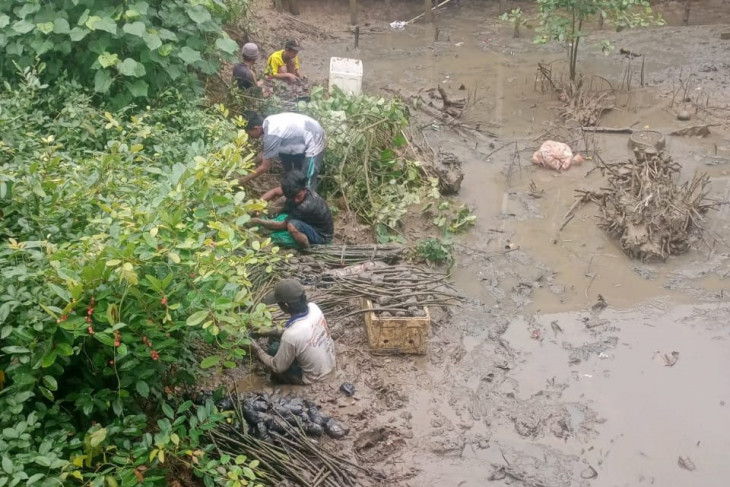
INDONESIA – The mangrove planting program developed by the Peatland and Mangrove Rehabilitation Agency (BRGM) in East Kalimantan is benefiting fish farmers and helping preserve the beach environment, an official has said. “The mangrove planting program is very beneficial for farmers. They feel that mangroves create living space for fish and crabs. Let’s hope that farmers can yield the benefit and the forest can become green once again,” head of a fish farmers group Borneo Mangrove Lestari, Ilham, said. In a written statement issued here on Saturday, BRGM stated that it has developed mangrove planting programs in Muara Badak, Ulu, and Kutai Karta Negara in East Kalimantan over an area of 162 hectares. READ MORE OCEANA Hypersaline water leaking into Adelaide mangroves again as ‘horrible history repeats’
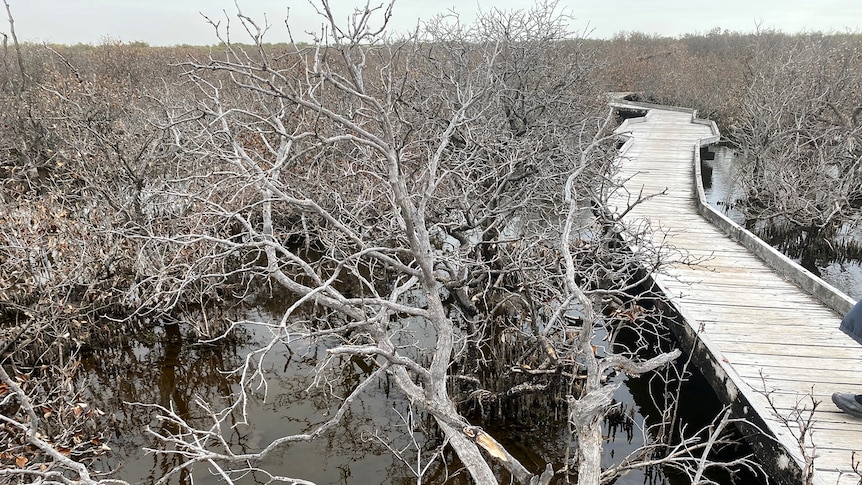
AUSTALIA – Hypersaline water is again leaking into mangroves from faulty ponds in Adelaide’s north, prompting calls for urgent action to avoid a repeat of last year’s ecological disaster that killed swathes of marshland. Some 10 hectares of mangroves and 35ha of salt marsh adjacent to the St Kilda Mangrove Trail has died since an adjacent salt mining company last year filled gypsum ponds with hypersaline water against the terms of its tenancy. The water leaked through cracks in the pond’s lining and started killing the mangrove forest immediately, with experts warning there were signs of stress and dieback in a greater 193ha area. Environmental expert Peri Coleman said pumping to remove the water was left too late, making it near impossible to remove the brine because the salt had started crystalising. READ MORE Like this newsletter?
Pease consider donating to MAP to keep it going.
Giving could never be easier  | URGENT ACTION VOLUNTEERS NEEDED! Saturday, Sept 25
Bradenton Beach, Florida – USA
New College of Florida and the Sarasota Bay Estuary Program seek volunteers to help plant native plants on Tidy Island, a large mangrove peninsula in upper Sarasota Bay. Please note that for safety reasons, this event is for volunteers age 10 and up. READ MORE Stop the East African Pipeline that threatens the planet #STOPEACOP – CLICK HERE Stop construction work on a private port In Defense of the Quilombo Boca Do Rio TAKE ACTION! Tell Sumitomo to stop building polluting coal power in Bangladesh! TAKE ACTION! Stop Adaro, Indonesia’s coal giant, from refinance its debt.
TAKE ACTION
Like this newsletter? Pease consider donating to MAP to keep it going. Giving could never be easier
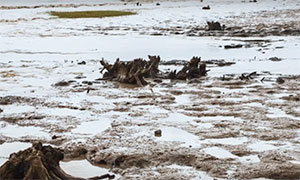
Restoring The Natural Mangrove Forest
Watch movie 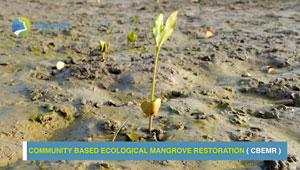
Community Based Ecological Mangrove Restoration in Rufiji Delta VIEW VIDEO Video: Mangroves for the Future – A look bacK. As the latest phase of Mangroves for the Future (MFF) draws to a close, this video highlights some of the project’s most successful initiatives – from local women supporting national park management in Viet Nam to an island in the Maldives that has become a model for waste management, and everything in between. View Here WANT TO GET INVOLVED?
Follow and Join MAP!    
Like this newsletter? Pease consider donating to MAP to keep it going. Giving could never be easier 

Singing for the Sundarbans WATCH HERE Entrevista con Monica Quarto del Mangrove Action Project (Spanish language) Oye Aqui
VOLUNTEER OPPORTUNITY 
MANGROVE ISSUES Want to learn more about mangroves?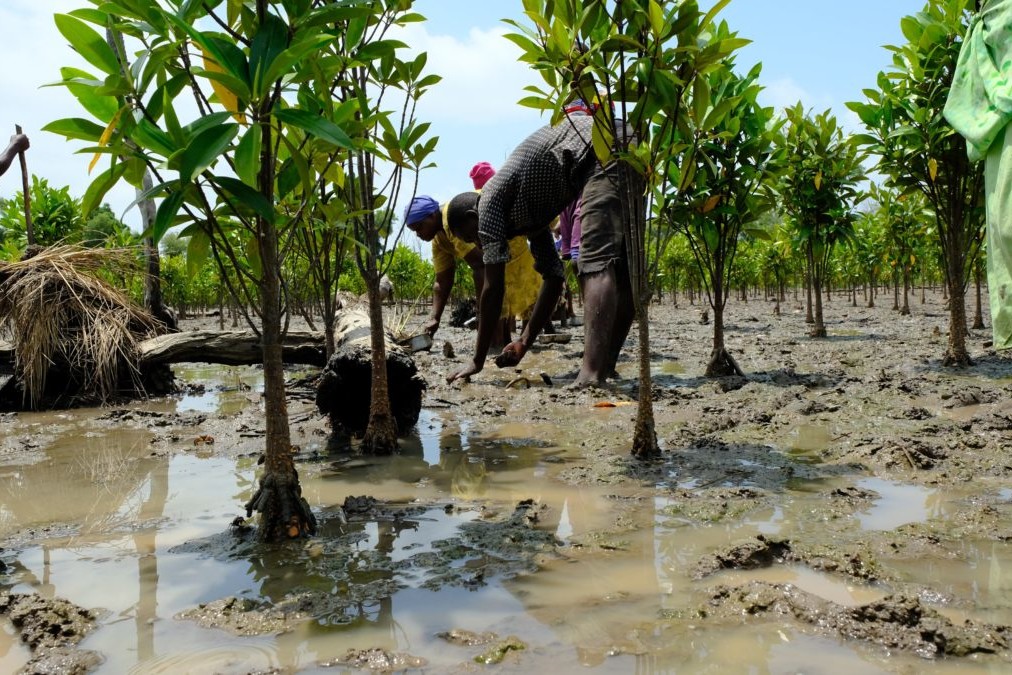
Our short presentation will give you a better understanding of the issues we are working to solve. WATCH PRESENTATION What is CBEMR? Download MAP’s 2 page CBEMR Information Sheet containing links to all MAP’s CBEMR resources – CLICK HERE
View MAP’s uploaded Videos at
MAP Video Gallery Question Your Shrimp Consumer/Markets Campaign!
WATCH VIDEO Mangroves: Guidebook to Malaysia – Click Here SHARE MAP’S VISION
CLICK HERE to watch short introductory video. Together we can work “at the roots of the sea”. Our short documentary, Reducing the Risk of Disaster through Nature-Based Solutions : Mangroves
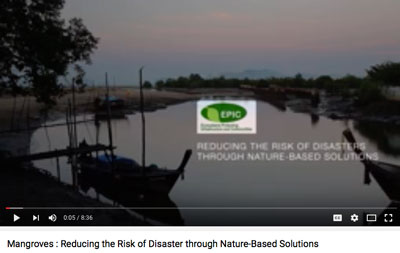
Marvellous Mangroves Curriculum The Marvellous Mangroves Curriculum begins with a simple philosophy – getting future generations to not only learn about, but understand the importance of mangrove forests. VISIT 
The award-winning Marvellous Mangroves (MM) curriculum educates children on the importance of mangroves and their ecological functions, teaching them about modern challenges and mechanisms for sustainability. VIEW VIDEO Marvellous Mangroves Curriculum in Bangladesh – WATCH VIDEO
MARVELLOUS MANGROVES IN BRAZIL
En Portuges 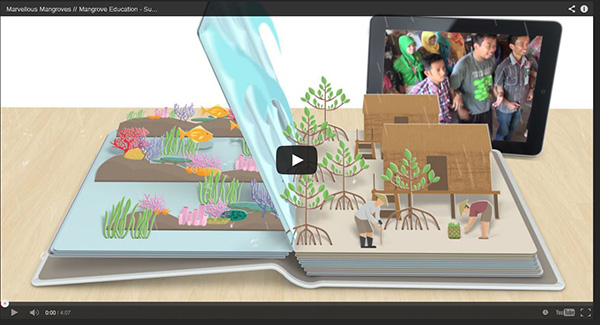
Marvellous Mangroves – A Curriculum-Based Teachers Guide.
Like this newsletter? Pease consider donating to MAP to keep it going. Giving could never be easier 
“Question Your Shrimp” Campaign Question Your Shrimp – is it really sustainable? Sign the Petition
Note to Our Readers: We strive to keep active links in our newsletter. However, due to circumstances beyond our control, occasionally links to stories may become broken. If you find a link to a story is not functioning, please cut and paste the headline into your browser search bar. In most cases you should be able to locate the original story.
Not yet a MAP News subscriber?
Click here to subscribe. 
|


























